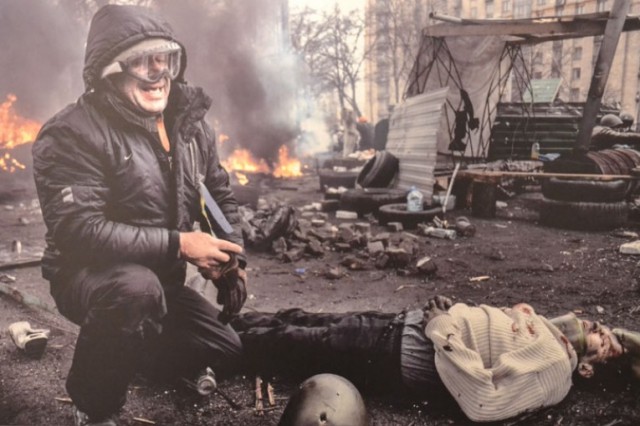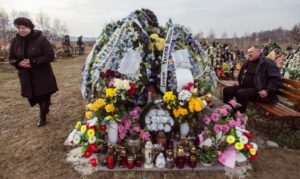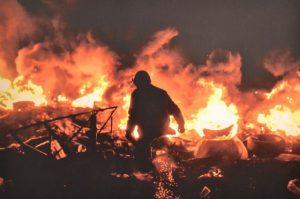The parents of Anatoliy Zhalovaha, who was shot during the Maidan protests a year ago, learned the bitter truth about their son’s death through photographs captured by Polish reporter, Jakub Szymczuk (Gość Niedzielny-Polish weekly). The photographs have been exhibited in several cities of Ukraine.
One emotional photo depicting two Maidan activists is especially painful. One man – Antatoliy Zhalovaha – lies dead while his brother-in-arms, Oleh Patskan, kneels beside him. Even at first glance we hear the heart-wrenching cry portrayed in the photo. This picture conveys it all: despair, hopelessness, and of course, the terrible realities of life.
Anatoliy Zhalovaha’s mother told me that their son was to be buried in Lychakiv Cemetery at the burial site reserved for the Heavenly Hundred. “But, I wanted him to be nearby. So, he now lies with his own and here he is closer to heaven. I can come here every day, so that’s also why I didn’t want him to be buried in Lviv, so far away.”
We stand in Dublyany Cemetery near Lviv, at the foot of her son’s grave. The cemetery is on a high hill. Anatoliy’s father, Hryhoriy, sits silently on a bench and stares blankly at the grave covered with flowers and wreaths. His mother, Liusya, whispers never-ending prayers over the grave….
I really wanted to tell the story of the two men depicted in Jakub’s photo – Anatoliy and Oleh. One day, Jakub was contacted by Andriy, the murdered boy’s brother and I got a chance to talk to him.
Our photographer, Jakub Szymczuk, was working in Kyiv during the Maidan protests and took many outstanding photos that show the bloody and tragic events of Black Thursday, February 20, 2014, when 53 people were shot and killed in cold blood. Jakub took the historic picture of Anatoliy and Oleh on Instytutska Street at 10:24. Anatoliy Zhalovaha, a humble young man from Dubliany, became one of the many iconic faces of the Maidan protest movement.
I met his parents in Dublyany. The family lives in a house that the father built. He owns a small construction company, and both sons – Anatoliy and Andriy - worked with him.
Andriy started a family and stayed with his parents, but Anatoliy wanted to see the world. He worked in Poland, Spain, and Russia. When the protests broke out, he wanted to travel to Kyiv. After watching the Berkut Special Forces brutally attacking and beating protestors on Tuesday, February 18, Anatoliy hopped on a bus that was taking activists from Lviv to Kyiv.
“The last time I spoke with my brother was Wednesday, February 19.” recalls Andriy. “He told me how difficult it was…. that it was a real war. Those were his last words. We couldn’t reach him the next day; we heard that the number of victims in Kyiv was increasing by the hour. We called friends that were on the Maidan with Anatoliy, but no one could tell us anything.”
It was chaos in Kyiv. The family learnt that the volunteers who had arrived on Wednesday morning immediately went to defend the barricades. No one registered them; no lists were made.
By the evening, Anatoliy’s parents had lost all hope. Someone called and reported that Anatoliy’s name was on the list of the dead and missing. Andriy and his father immediately went to Kyiv to search for the body. They were sent to St. Michael’s Monastery, where the dead and wounded were attended to. There, they first saw Anatoliy. Later, they took his body from the morgue, where it had been stored among the other dead heroes… wet, dirty, the heads and clothes caked with blood.
Thousands came to Anatoliy’s funeral in Dublyany. The mourners cried out – “Heroes never die!” – over and over again, but the parents still did not know how their son had died. In the summer of 2014, volunteers who collected documentation on the Maidan killings sent them many pictures asking them to identify anyone they could. They saw Jakub Szymczuk’s photos and immediately got in touch with him, hoping that he would tell them more about the circumstances of their son’s death.
Jakub Szymczuk then told the Zhalovaha family about the man “with the silent scream on his face” kneeling near Anatoliy’s body. His name was Oleh Patskan, a 58-year-old soldier from Drohobych.
In the nineties, Oleh had served in the international peacekeeping force in Yugoslavia. He was on the Maidan from December 2013 to March 2014. In view of the fact that Oleh had witnessed the last minutes of Anatoliy’s life and his death, the family could finally call for an official investigation.
With this photo and a witness, Anatoliy’s father made sure that the investigation was carried out by the prosecutor’s office. We now know that Anatoliy and Oleh were part of the eighth barricade, which was the closest to Bankova Street where the Presidential Administration was located. Barricades of concrete blocks, powerful KAMAZ and heavily armed police units stood opposite the building. The Berkut Special Forces and snipers were also stationed there; at some point, they opened fire at the activists who were defending their own positions on the barricades.
We sit and watch the video of the bloody nightmare that developed on Instytutska Street. We hear the shots and see the victims dropping one by one to the ground. Only a small group of defenders remains near the fence. Jakub Szymczuk, our photographer, is among these men; he can be identified by the white helmet on his head.
It was not a difficult job for the snipers as the victims were not more than 50 meters away. The activists set fire to old tyres in order to protect themselves, hoping that the thick dark smoke would conceal them.
Jakub remembers Anatoliy running towards the barricades to throw a tyre onto the blaze. It was then that a bullet struck him in the head. A moment later, Oleh Patskan pulled Anatoliy to safety. “I carried him to the barricade as I thought he would still be alive, and I could help him in some way.” When Oleh realized that Anatoliy was dead, he spread his hands and howled with anger and despair. It was then that Jakub Szymczuk took the photograph….
For many months, Anatoliy’s parents could not understand why their son was wearing someone else’s clothes. “Look,” said the father, pointing to Anatoliy’s pants and sweater in the photo. “Everything is too big on him. It seems that he left his wet clothes somewhere on the Maidan.”
On Wednesday, Anatoliy stood on the barricades under the freezing water raining down on the protesters from water cannons operated by police. The battle raged through the night. The next day, the boy picked up some dry clothes lying nearby and ran to defend their position on the barricades.
Investigators discovered something very important: Anatoliy and ten other activists were killed with the same weapon. This particular sniper weapon must be specially controlled and was not used by any of the units that were on the Maidan during the protests. The serial number had been obliterated on all the guns, clearly indicating that the Berkut attack was a calculated murder plan. Unmarked weapons cannot be identified.
Oleh Patskan admits that he is disappointed with the course of the inquiry.
“This is a shitty investigation.” Patskan remarked over the telephone. “We’ll find the truth ourselves, and documents such as Jakub’s photos really help."
When we returned from the cemetery, Anatoliy’s father told me what Anatoliy said before he left for Kyiv.
“Anatoliy probably felt that his life was at a turning point. During the last Vodokhreshche, he jumped into the icy blessed water (Feast of Baptism of Jesus Christ in the River Jordan celebrated in Ukraine on January 19-Ed.). When I asked him why he’d done it, he replied that he wanted to be reborn and prepared for the future. When I scolded him that it was time to settle down and stop wandering around the world, he looked at me strangely and replied very quietly: “You know, Father, one day you will be very proud of me.” And so it is, but I wish he were alive...”




